A talk by See Huang Lim, a missionary at IBF.

Recently more than one person has asked me, “Why should I trust the Bible? Since it’s written by humans, isn’t it biased?” Another friend asked, “I know it is important to read the Bible, but how can I understand it correctly?”
These are very important questions that we should be able to answer. So today I’d like to answer two questions: “First, briefly, what is the Bible? Second, how can I trust trust the Bible?” My next message, on June 23th, will be about how to read and interpret the Bible. Let’s pray.
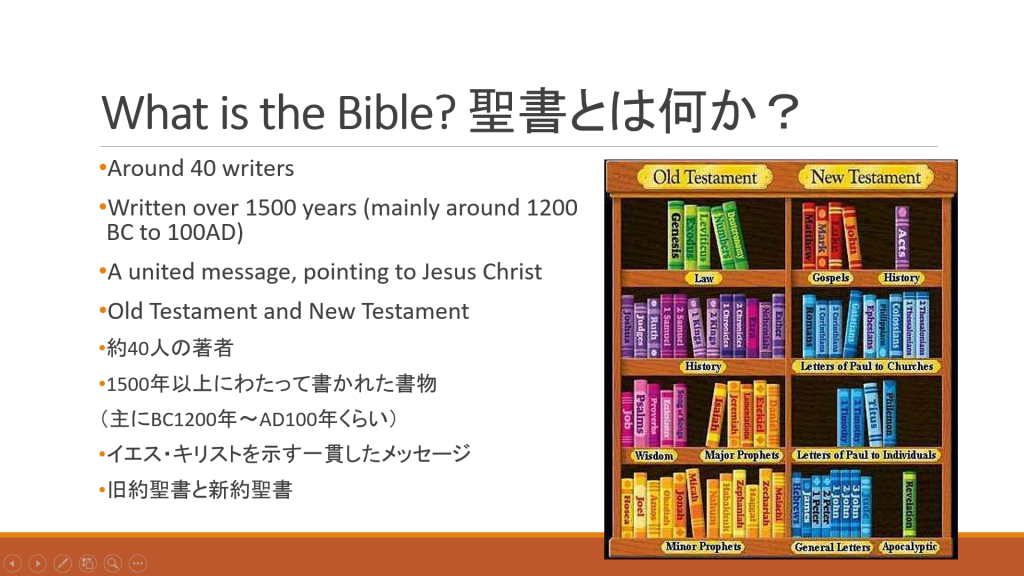
What is the Bible?
First, what is the Bible? It’s one of the most influential books in history, exploring the question of why we exist, who we are, and our future—through the eyes of God. It’s a collection of writings by 40 different authors over a span of roughly 1,500 years. Yet it has a remarkably united message.
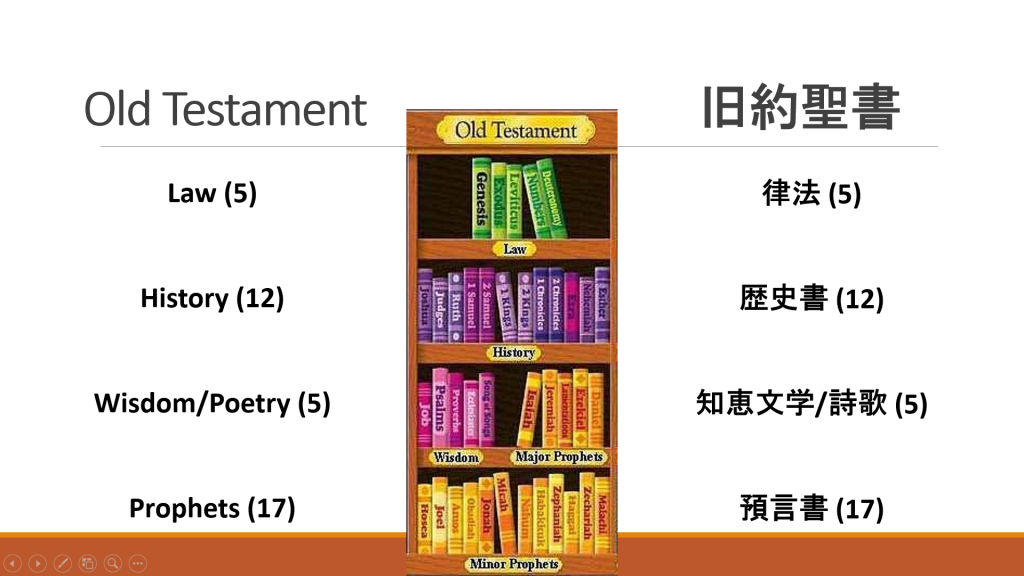
The first half of the Bible is called the Old Testament. The Jewish people of Israel believed that God speaks through these writings by human authors. The authors were mostly prophets and leaders of Israel.
Although the Old Testament tells the story of ancient Israel, it’s also the story of what God is doing for all humanity—past, present, and future. The story creates hope for a promised leader or “Messiah” whom God will send to renew our broken world. But the Old Testament ends without this leader appearing. It’s a story with no conclusion.
A few centuries later, a Jewish man named Jesus of Nazareth claimed he was continuing the story. Jesus and his followers said he was the long-awaited Messiah who would restore the world. Some of his early followers were called “apostles”.
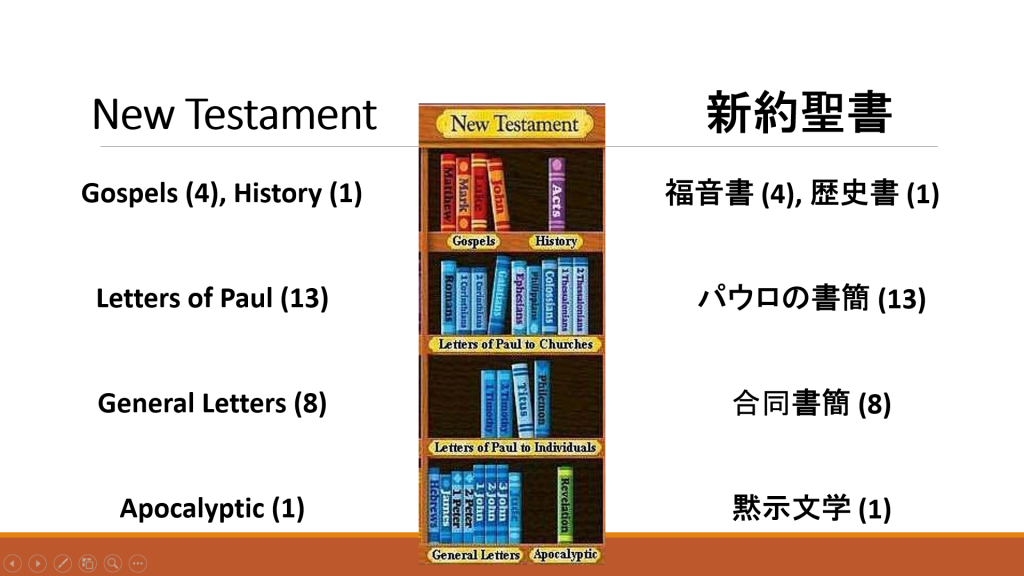
His early followers recorded Jesus’ life, death, teachings, and miracles. Their accounts are called the four Gospels, which you can find at the beginning of the New Testament. The New Testament also has a history of the early church and many letters written by apostles to teach, correct, and encourage these churches.
Overall, the Bible tells a single major story, pointing to the person of Jesus. This story says that humans rebelled against God. The consequence was death, alienation from our Creator, and the brokenness of our world. But because God still loves us, he took the punishment of our sins, in the form of Jesus dying on a cross. Those who accept Jesus as God’s chosen savior will be forgiven and experience a new relationship with God. The Bible claims that the one person you need to know is Jesus, and that your responses to him will profoundly affect your life today and your next life.
The Bible claims to be God’s Word
Though recorded by human authors, the Bible considers itself the Word of God. The phrase “Thus says the Lord” and other similar phrases occur about 3,800 times. When Jesus quotes the Old Testament, he never questioned its authority as the Word of God (e.g. Matthew 5:17, Mark 7:13).
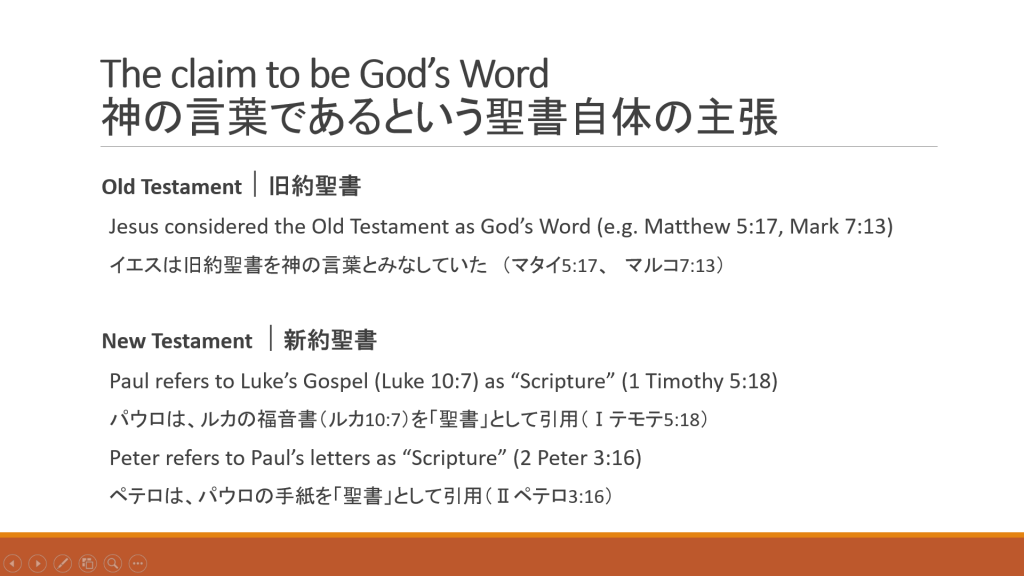
What about the New Testament? In a New Testament letter from Apostle Paul to his disciple Timothy, we see that Paul considered the gospel of Luke to be the Word of God. In Paul’s letter called 1 Timothy (5:18), Paul quotes a sentence from Luke’s writing (10:7) and refers to it as “Scripture”. Meanwhile the Apostle Peter, one of Jesus’ earliest disciples, refers to Paul’s letters as “Scripture”. This is found in 2 Peter (3:16), which you can read on your own time.
In other words, from very early in church history, the writings of the New Testament were viewed as being on the same level as the Old Testament as God’s Word. Though the Bible has different human authors, they were inspired by one divine author, God.
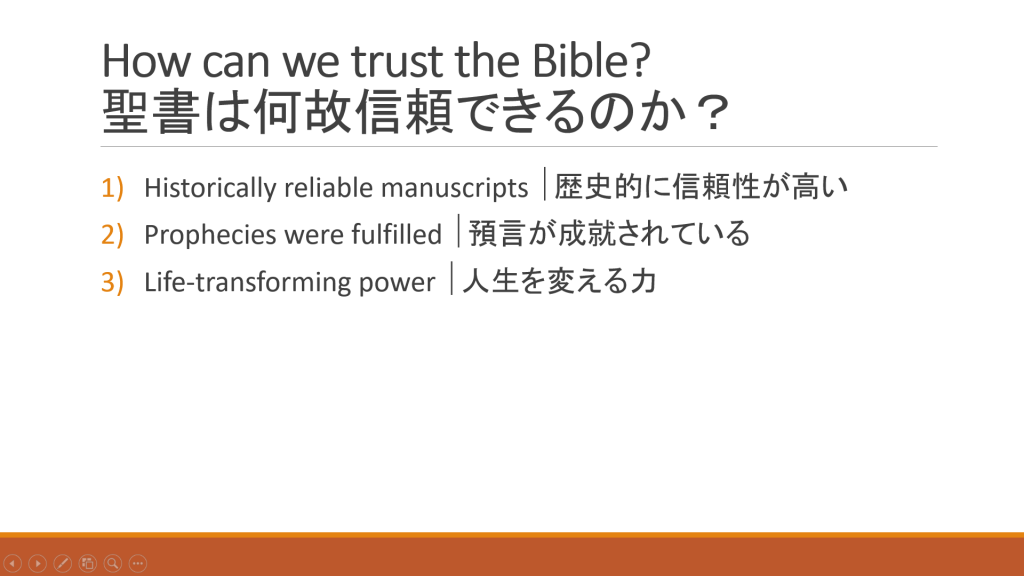
How can I trust the Bible?
The Christian faith depends entirely on Jesus’ claim that he is God. He provides many forms of evidence for this; the most powerful is his resurrection from death. These claims and evidences are recorded in the Bible. But how can we trust what the Bible says?
I will share 3 reasons for trusting the Bible. Each of these reasons is a big subject, but I will only briefly summarize them.
1) The first reason for trusting the Bible is that its ancient manuscripts are considered historically reliable, even by respected non-Christian scholars.
2) Second, many of the Bible’s prophecies have come true.
3) Third, the Bible has power to transform lives.
The Bible is a historically reliable document
First, let’s talk about the Bible’s historical reliability. There are two issues here. The first issue is this: How do we know the Bible we have today is identical or almost identical to the original writings from thousands of years ago?
Answering this question is the job of a scholar of textual criticism. Scholars of textual criticism try to reconstruct the original text of ancient manuscripts. To judge how reliable a manuscript is, they look at two things. First, how many early manuscripts do we have? Second, how long is the time gap between the early manuscripts and the supposed original? The more manuscript copies we have and the earlier they are, the more reliable the text is.
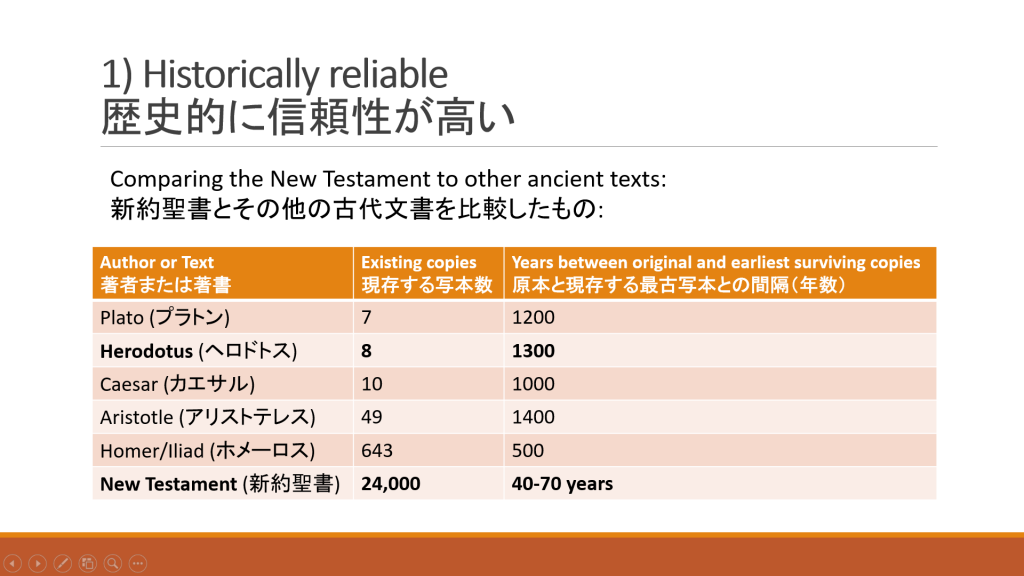
For example, here is some ancient Greek and Roman literature that modern historians consider to authoritative.
Writings by the famous Greek historian Herodotus are believed to have been written in 5th century BC. But the earliest copies we have are only from AD 900—and there are only 8 copies. There is a 1,300-year time gap between the supposed original and the earliest available copy.
Compare this with the Bible’s New Testament. The earliest fragments are dated AD 130, close to the events of the New Testament. The time gap is only 40-70 years. We also have complete New Testaments manuscripts from as early as AD 350. How about the number of manuscripts? In total, we have thousands of manuscript copies.
This is why the Bible is considered reliable as a historical document. It does not mean the Bible is true, but it means the Bible we have today is identical or similar to the original writings.
Some skeptics ask, “How do you know the Bible isn’t full of errors and that its meaning hasn’t been changed over the years?” I don’t have time now to give the long answer, so let me just give you the conclusion: Actually, this issue is no longer debated by non-Christian scholars. If we want to reject the Bible based on historical reliability, we have to reject other writings from ancient times, up to about AD 1000.
To conclude the first issue of reliability: University of Notre Dame professor Eugene Ulrich studied the Dead Sea Scrolls. He said, “The scrolls have shown that our traditional Bible has been amazingly accurately preserved for over 2,000 years.”
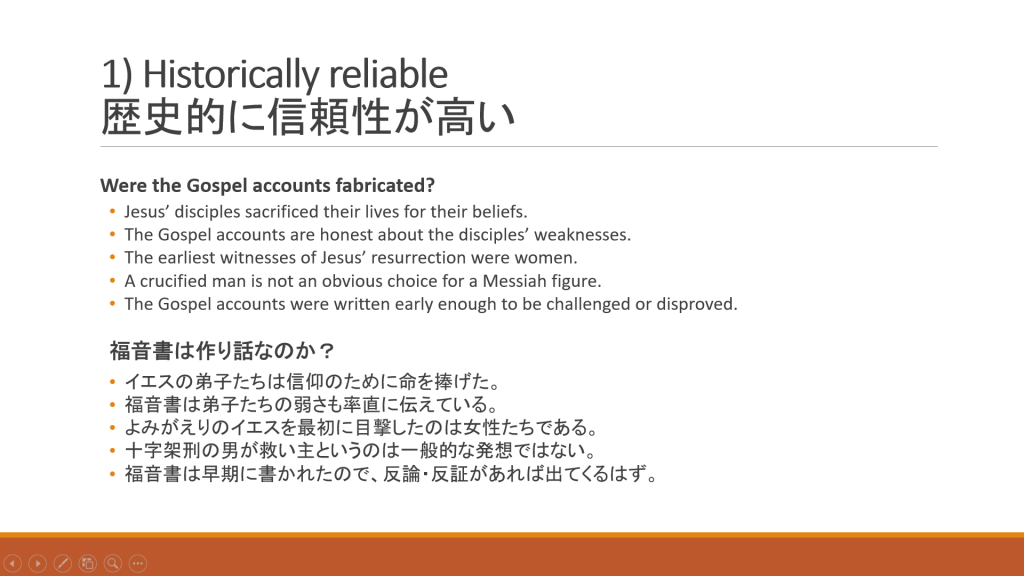
The second issue of reliability is: How do we know whether the disciples fabricated stories about Jesus? That’s possible. But then we need to ask, “When and, more importantly, why did they fabricate these stories?” Remember that most writers of the New Testament died painful deaths for their beliefs. If what they believed was a lie, why did they choose to die so horribly for a lie?
If the disciples merely wanted to create a new religion for selfish reasons, a fabricated Gospel would look quite different from the one we have.
For example, a false gospel would idealize the early Church’s leaders rather than make them look weak and sinful. Instead, the Bible is honest about the disciples’ character flaws. Next, a false gospel would probably not use women as reliable eyewitnesses, because in ancient times, women’s testimony was not acceptable in court. However, the Bible portrays women as the earliest witnesses of Jesus’ resurrection. Also, a false gospel would probably not have chosen a crucified Jesus as their Messiah figure. This is because many Jews, Romans, and Greeks would view a crucified man as a shameful criminal or a weak Messiah who failed.
Lastly, Gospel accounts of Jesus were written early enough to be challenged by numerous eyewitnesses who were still alive, including Jesus’s opponents. But the Gospel has not been proven false.
As I mentioned earlier, even non-Christian scholars no longer dispute the historical reliability of the Gospels. Sure, they may not believe the claims of Jesus to be divine. But they would find it hard to deny that the disciples really believed in Jesus’ divinity and resurrection.
Still, this alone does not mean the Bible is truly God’s Word. So let’s also look at two other reasons to trust the Bible: the Bible’s fulfilled prophecies and its power to transform lives.
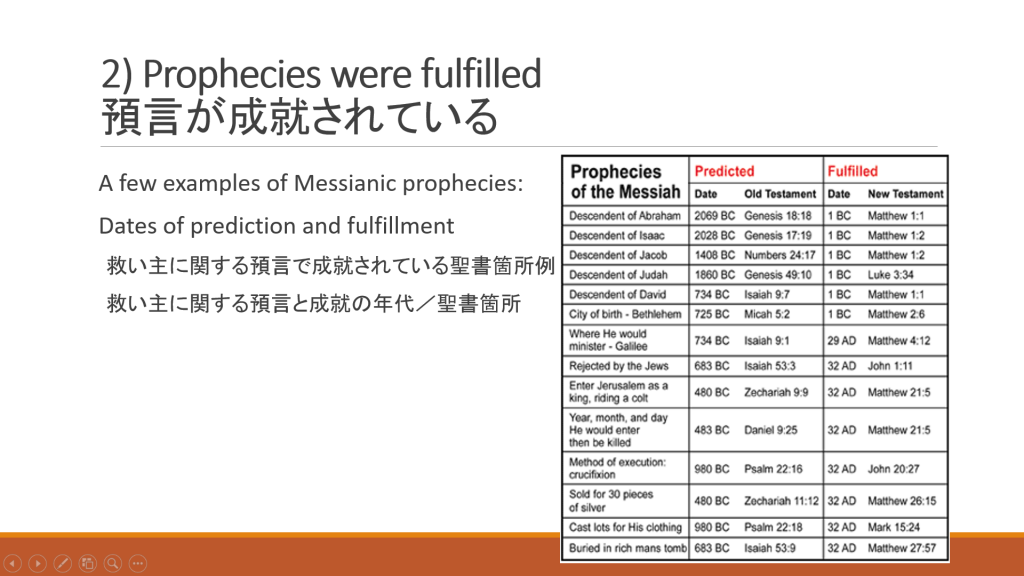
The Bible’s prophecies were fulfilled
Let me touch on prophecies very briefly. The Bible contains many prophecies, but the most convincing and relevant are its prophecies about the Messiah, God’s chosen Savior.
For example, the prophet Micah predicted that the Savior would be born in Bethlehem. The prophet Isaiah wrote that the Messiah would die for his people. These prophecies were fulfilled in Jesus. In the Old Testament, there are hundreds of prophecies about the Messiah, providing details about where he will be born, his mission, and his death. These prophets wrote several hundred years before Jesus’ birth.
So, it’s either pure coincidence—which would take a leap of faith to believe—or, the prophets were truly inspired by God.
The Bible has power to transform lives
My third reason for trusting in the Bible is because it has power to transform lives.
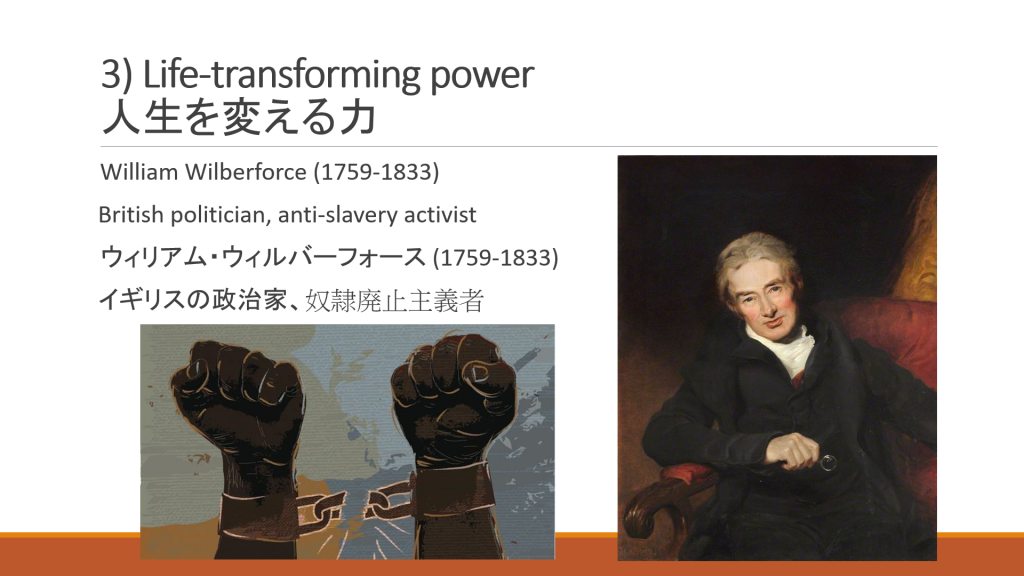
Have you heard of an Englishman named William Wilberforce? Though he grew up in a Christian home, he didn’t become a serious Christian until his mid-20s. He began reading the Bible for himself and realized that the way he had been living was wrong. He then devoted his life to God, and through politics, he worked to abolish slavery. Thanks to his movement, the slave trade was made illegal in the United Kingdom in 1833. You can learn about his story from a 2006 secular film called Amazing Grace.
We also hear about people who study the Bible to show how unreliable it is but end up becoming believers.
A.S.A. Jones was an atheist who decided to read the Bible cover-to-cover, in order to make fun of it. But she found it to be unlike other books. She said, “This book was reading me as surely as I was reading it. Every time I found fault with its god, I ended up finding a fault of my own.” She eventually became convinced that God spoke to her through the Bible, about her sinfulness and need for a Savior.
The book of Hebrews (4:12) says, “For the word of God is alive and active. Sharper than any double-edged sword, it penetrates even to dividing soul and spirit, joints and marrow; it judges the thoughts and attitudes of the heart.”
I was 15 when I first encountered this. Initially, I found the Bible confusing because it had so many names I wasn’t familiar with. So I asked God, “If this is really your Word, please speak to me.” At that time, I wasn’t a Christian. I was just desperate for help because of my family problems. I opened the Bible to a random page, and my eyes fell on Psalm 27:10. It said: “Though my father and mother forsake me, the Lord will receive me.” My hands began to shake and my heart pounded.
Out of the whole Bible, how did my eyes fall on something so relevant and personal? From that day, I started to think that God does exist and that He speaks through the Bible. Since then, my life has changed tremendously.
Conclusion
Let me end with a final question: “If the Bible is really the Word of God, why do so many people not recognize it as true?” There can be many reasons: emotional, social, cultural, or spiritual reasons.
The Bible itself mentions one reason: “The person without the Spirit does not accept the things that come from the Spirit of God but considers them foolishness, and cannot understand them because they are discerned only through the Spirit.” (1 Corinthians 2:14)
Even if the Bible is truth, it takes certain “ears” to hear it.

There is an internationally famous violinist named Joshua Bell. Music lovers are willing to pay hundreds of dollars to attend his performance. One day, as part of a social experiment, he played the violin near a subway station in Washington DC during rush hour. He wore a baseball cap and pretended to be a busker. He only managed to get $32. In 45 minutes, about 1000 people passed by. But only 7 people stopped to listen and only 1 person recognized him.
Why didn’t more people recognize that his music is worth thousands of dollars? Sometimes, people are just too busy to stop and listen. Others may be interested but too busy to seriously investigate.
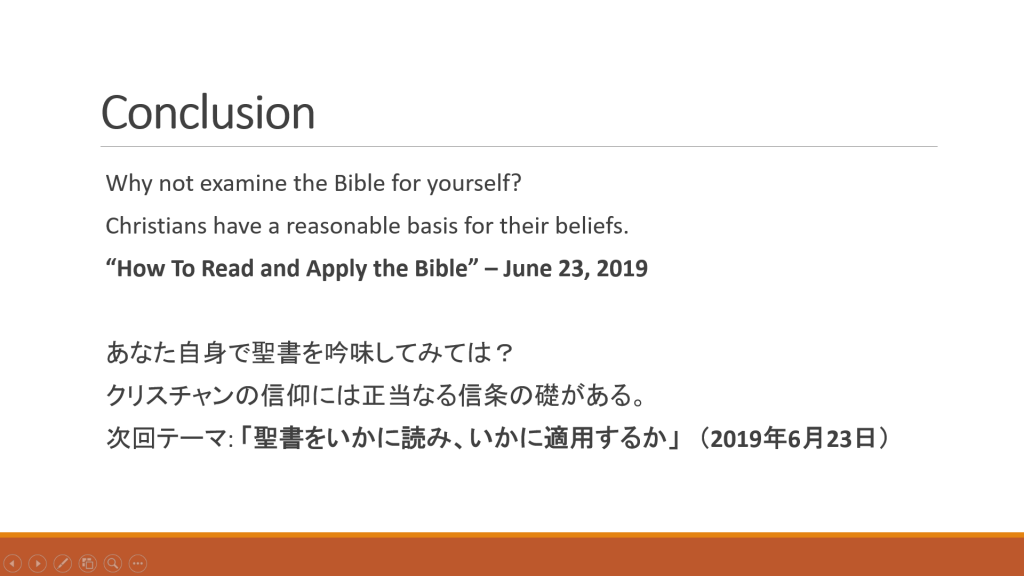
Before dismissing the Bible as an old, outdated book, we should investigate what it really says. Rather than rely on hearsay from other people, why don’t we examine it for ourselves?
To conclude: Christians have a reasonable basis for their beliefs. Our beliefs are based on the Bible, which can be accepted as reliable.
But belief is only the beginning of our journey; the Bible says we must not only hear but also do what it says.
In my next message on June 23th, I will talk about how to read the Bible and apply what it says. Meanwhile, I hope today’s message has been helpful to you. Please let me know if you have any questions or comments.




 日本語
日本語